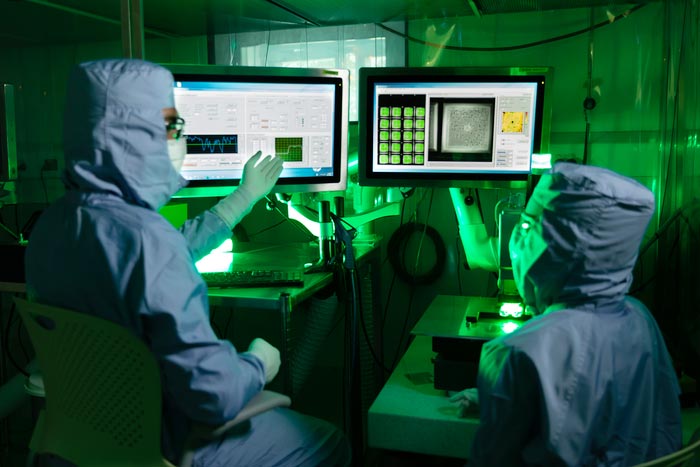Needle-free COVID-19 vaccine shows promise

Technicians working with the high-density microarray patch in the Vaxxas cleanroom.
Credit: Vaxxas
A needle-free COVID-19 vaccination could be possible, with University of Queensland scientists successfully protecting mice from the virus by administering a US-developed vaccine candidate with a ‘patch’.
The University of Texas Hexapro vaccine candidate – delivered via the UQ-developed and Vaxxas-commercialised high-density microarray patch (HD-MAP) – provided protection against COVID-19 disease with a single, pain-free ‘click’ from a pocket-sized applicator.
Dr David Muller, from UQ’s School of Chemistry and Molecular Biosciences, said the vaccine patch produced strong immune responses that were shown to be effective when the mice were exposed to SARS-CoV-2 – the virus that causes COVID-19.
“When the Hexapro vaccine is delivered via HD-MAP applicator – rather than a needle – it produces better and faster immune responses,” Dr Muller said.
“It also neutralises multiple variants, including the UK and South Africa variants.
“And it’s much more user-friendly than a needle – you simply ‘click’ an applicator on the skin, and 5000 microscopic projections almost-imperceptibly deliver vaccine into the skin.”
Dr Muller said the UQ team, together with Vaxxas, hoped to take the technology to the world and are looking for funding opportunities to accelerate to clinical trials as soon as possible.”
“Hexapro, delivered by the high-density microarray patch, could dramatically assist global vaccine rollout effort, particularly for billions of vulnerable people in low- and middle-income countries.
“We’ve shown this vaccine, when dry-coated on a patch, is stable for at least 30 days at 25 degrees Celsius and one week at 40 degrees, so it doesn’t have the cold chain requirements of some of the current options.”
President and CEO of Vaxxas, David L. Hoey, said he was extremely excited about the findings.
“These results are extremely clear – vaccination by HD-MAP produces much stronger and more protective immune responses against COVID-19 in model systems than via needle or syringe,” he said.
“We thank and recognise our incredible research collaborators at UQ for these important findings.
“The prospect of having a single-dose vaccine, that could be easily distributed and self-administered, would greatly improve global pandemic vaccination capabilities.”
The research is published in Science Advances (DOI: 10.1126/sciadv.abj8065).
A video media release and photos are available via Dropbox.
Journal: Science Advances
DOI: http://dx.doi.org/10.1126/sciadv.abj8065
Article Title:Complete protection by a single-dose skin patch–delivered SARS-CoV-2 spike vaccine
Article Publication Date: 29-Oct-2021
Expert Contact
Dr David Muller
The University of Queensland
d.muller4@uq.edu.au
Office: +61 401 858 518
Cell: +61 401 858 518
All latest news from the category: Medical Engineering
The development of medical equipment, products and technical procedures is characterized by high research and development costs in a variety of fields related to the study of human medicine.
innovations-report provides informative and stimulating reports and articles on topics ranging from imaging processes, cell and tissue techniques, optical techniques, implants, orthopedic aids, clinical and medical office equipment, dialysis systems and x-ray/radiation monitoring devices to endoscopy, ultrasound, surgical techniques, and dental materials.
Newest articles

Parallel Paths: Understanding Malaria Resistance in Chimpanzees and Humans
The closest relatives of humans adapt genetically to habitats and infections Survival of the Fittest: Genetic Adaptations Uncovered in Chimpanzees Görlitz, 10.01.2025. Chimpanzees have genetic adaptations that help them survive…

You are What You Eat—Stanford Study Links Fiber to Anti-Cancer Gene Modulation
The Fiber Gap: A Growing Concern in American Diets Fiber is well known to be an important part of a healthy diet, yet less than 10% of Americans eat the minimum recommended…

Trust Your Gut—RNA-Protein Discovery for Better Immunity
HIRI researchers uncover control mechanisms of polysaccharide utilization in Bacteroides thetaiotaomicron. Researchers at the Helmholtz Institute for RNA-based Infection Research (HIRI) and the Julius-Maximilians-Universität (JMU) in Würzburg have identified a…



